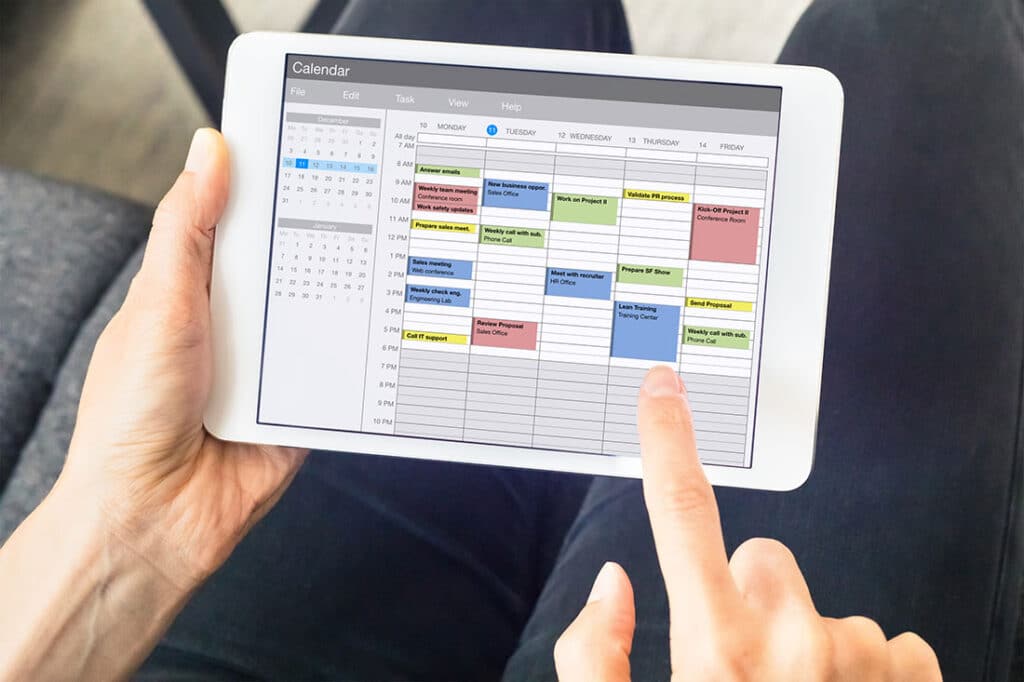We saw a new surge of private investigator demand during COVID-19 for jobs like investigating work-at-home employees, and surges after the lockdowns ended for industries like renting, where landlords want careful vetting of potential tenants. If you’ve been accepting new jobs like these recently, time management is more important than ever. Juggling multiple investigations can become stressful, especially when managing your work/life balance around them. Let’s go over some time management tricks to keep in mind when tasks start piling up.
Find the Best Time for Research and Schedule Around It
Everyone has a prime time to sit at their computer and get things done. It might be early in the morning, or after things get quiet in the evening, or relaxing after lunch, etc. Find the best time for you to focus on computer work without getting distracted and designate that as your research time. Use this time to research cases online and gather digital information to find a lead or complete cases as well as emailing clients and managing other social media. Don’t schedule other activities during your computer time if you can help it.
Grab Some Dictation Software for Your Phone
Dictation apps are excellent speech-to-text software that can create transcripts just by listening to nearby conversations. That’s a timesaver, not only for recording interviews (which can then be searched by word later), but also when making voice notes if you don’t have the time right now to type something up. There are many speech-to-text apps available, but popular options include Otter, Dragon, and Verbit.
Make Your Surveillance Time as Useful as Possible
A long-term stakeout or patient surveillance job can quickly start to feel like a waste of time. But there are ways to make it more productive – without taking your eyes off your target. If you find yourself frequently surveilling, you may want to invest in a pair of wireless earbuds with included mics so you can talk hands-free to voice assistants or use the text-to-speech apps that we mentioned above to make notes, observations, and reminders. Plus, it’ll look a little less suspicious than sitting and doing nothing.
Have a Go-To Task List for Missing Persons
Missing person and skip tracing investigations remain some of the most common PI jobs. There are many, many tools available online to help track people down and find important factors about where they may be – as well as a number of important questions to ask your client. It can help save a lot of time to have a step-by-step template of what to do at the start of a missing person’s case. That can include services and directories you prefer to use, like looking up bankruptcies, tax liens, asset searches, criminal backgrounds, education histories, and more. It could include investigating social media or looking up business records. Create a list of sites and resources to visit, one by one, to work on any missing person’s case, and your investigations will be much easier to organize.
Invest in Some Reliable GPS Technology
We’ve discussed before about whether GPS technology is legal in private investigations (bugging someone’s car in a public place, for example, is still a legal gray area). However, GPS can be a big timesaver in all its forms. You can use it to find your way around a new neighborhood, record your route when tailing another person or vehicle, and studying a new area before planning your boots-on-the-ground activities there. Avail yourself of any GPS tools to help make cases easier.
Review Your Case File Practices
How do you file your cases? This becomes especially important when juggling multiple clients. Ideally, every case should have a separate folder and ID number on your computer where you store all related documents, screenshots, transcripts, and so on, that corresponds with a physical folder and ID number for keeping physical documents, photos, and evidence that you’ve collected. Your own personal system can vary but look for a way to keep cases separate and easily identified so you don’t put documents in the wrong spot or lose evidence.
Have Separate Work and Life Devices
We know this isn’t always workable, but if possible have separate devices for your PI job and your home life: That includes separate phones, separate computers, separate email accounts, and more. Not only does this help cut down on possible liability issues or workplace data theft, but it also makes it a lot easier to organize cases and get tasks done when you have dedicated devices for them.
Conclusion
It’s rarely a bad time to do an audit of your investigative practices and look for ways to become more efficient, get better results, and communicate more effectively! Even if you are already practicing the tips we discussed on our list, you’re likely to find other ways to optimize your setup, your gear, and how you research. Remember, new tools are being created all the time to help PIs, and everyday productivity apps can be doubly useful for investigations trying to claw back some free time.






